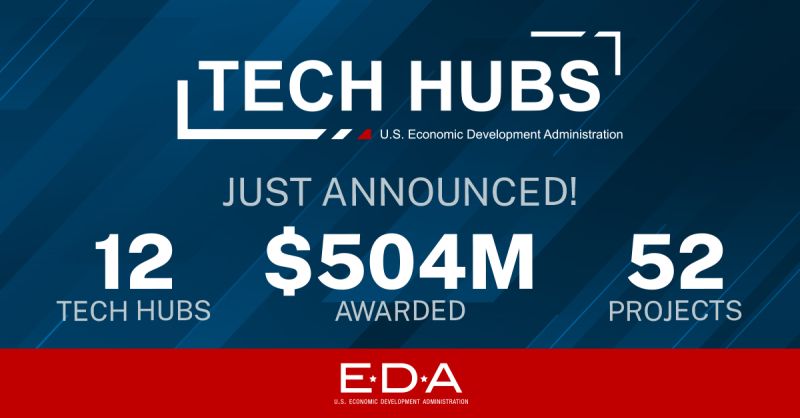For months, metro areas around cities like Baltimore and Philadelphia have vied for federal funds to boost local tech economies.
But the latest round of the DC-based Economic Development Administration’s (EDA) $500 million funds for tech hubs left both these cities off the list. The Phase 2 project implementation funds announced on Tuesday narrow the 31 tech hubs down to 12 awardees because the agency hasn’t yet gotten the appropriations to fund them all, an official with the EDA’s parent Commerce Department told Technical.ly.
“We hope this is just the first round of implementation awards,” the official said.
Despite the tech hubs getting $10 billion through the CHIPS and Science Act, Congress has only appropriated $541 million toward the program so far.
“With more funding, we will make more awards,” added the official, who declined to be named on the record.
The EDA Tech Hubs program funnels federal money into local projects. The first phase’s bidding process began in 2023, and the Biden Administration published the full list of 31 designated hubs in October of that year (29 of them received strategy development grants).
The most recent phase of awards went to hubs in Colorado, New Mexico, Montana, Indiana, Illinois, Nevada, New York, New Hampshire, South Carolina, Georgia, Florida, Ohio, Oklahoma and Wisconsin. (Find the full list here). Baltimore had requested $70 million and Philly sought out $80 million in this latest round, but neither was selected.
But more could be coming soon, according to the Commerce Department official.
“If the program receives additional appropriations,” the Commerce Department official said, “all 31 designated Tech Hubs will be eligible to apply directly for Implementation grants using previously submitted or new proposal materials.”
Baltimore and Philly react to the snub
Mark Anthony Thomas, president and CEO of the Greater Baltimore Committee, said in an emailed statement that while he was “disappointed” by the outcome, the Baltimore proposal organizers will get $500,000 of federal funds to subsidize a reapplication.
“The grant will provide us with additional time and capacity to strengthen our case for the next phase and continue our efforts to maximize the benefits of being selected as one of the 31 hubs in this highly competitive process,” Thomas said.
“Our application received more than 100 letters of support, outlining commitments totaling more than $800 million,” he added. “Several factors likely influenced the initial funding decisions. Moving forward, we will collaborate closely with Commerce and our partners to ensure that the investments made by the Baltimore Region in the federal tech hub program deliver the progress and impact we all aspire to achieve.”
Ken Malone, executive officer of Baltimore consortium member Early Charm Ventures, said that going for the bid helped create something that the region can still use.
“We won by competing,” he said. “Competing gave us a regional tech-based economic development plan which put equitable development at its core. It’s the right plan, we’ll just find other ways to fund it.”
Other Baltimore technologists and industry leaders also remain optimistic about where the city can go from here.
“Fearless and Hutch remain committed to increasing the number of technologists from underrepresented and nontraditional backgrounds, and increasing the number of AI companies through our workforce development and apprenticeship initiatives, and our accelerator,” said LaToya Staten, executive director, technology growth initiative at digital services company Fearless. “This work is critical to expanding the technical ecosystem and expertise in the region. Fearless will leverage the Technology Growth Initiative, the external impact arm of Fearless, to sustain Hutch and its workforce initiatives.”
In Philly, Ben Franklin Technology Partners leads the PROPEL Tech Hub which also did not get funding this round. The effort spans Delaware, Maryland, New Jersey and Pennsylvania. Anthony Green, chief scientific officer for Ben Franklin Technology Partners and lead of PROPEL, told Technical.ly in an email that the group wasn’t sure what adjustments will need to be made to move forward with the project.
“While this is not the news we hoped for, all of us at Ben Franklin Technology Partners of Southeastern Pennsylvania are enormously proud of the unprecedented collaboration by the more than 70 organizations, institutions and private enterprises,” Green said. “We will continue to pursue the public and private funding that will best enable us to do so.”
For more context and analysis of this decision, check out Technical.ly CEO Chris Wink’s recent reflections via LinkedIn:
Updated at 5:30 p.m.
This article mentions Fearless, a Technical.ly client. That relationship had no impact on this report.







